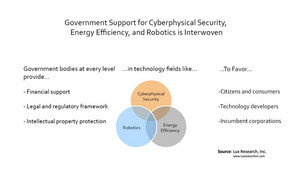BOSTON, MA--(Marketwired - Jan 19, 2016) - Federal, state and local governments pour an estimated $55 billion into information and communication technologies (ICT) -- but better structuring of the funding plans is needed to create better outcomes, according to Lux Research.
Governments and IT developers should apply principles like modularity, scalability and interoperability to ICT funding itself -- prioritizing cyberphysical security and open-source IP in areas like the industrial Internet and precision agriculture.
"While funding has obviously helped make the U.S. a global leader in ICT, government support has had mixed results," said Mark Bünger, Lux Research Vice President and lead author of the report titled, "Funding the Future: How U.S. Federal, State, and Local Governments Support ICT Innovation."
"When governments get too enthusiastic, their efforts contaminate the competition, rather than improving it. For the truly big challenges facing the world, this fragmented, noncollaborative and expensive approach threatens to undermine the very goals it seeks to achieve," he added.
Lux Research analysts estimated aggregated government funding to ICT technologies and evaluated its impact on hot-button issues in this presidential election year, such as securing energy supply, defending against global and domestic terrorism, establishing leadership in autonomous vehicles, and creating advanced manufacturing jobs. Among their findings:
- Defense tops federal funding. Of the estimated $40 billion federal government funding on ICT programs, nearly a quarter, or $9.4 billion, goes to the Defense Information Systems Agency (DISA).
- State funding is harder to measure. The best nationwide database on state ICT funding tracks 265,000 subsidy awards from 551 programs for an estimated $140 billion, spread out over a decade. Local city and regional governments vie for high-tech employers but their "spending" usually comes in the form of tax breaks and zoning changes -- which is often a zero-sum game for the country as a whole.
- Holistic approach is missing. Government support remains a patchwork, treating vital topics like cyberphysical security, energy efficiency, and robotics as separate domains, subject to different regulatory bodies. In reality, IT, energy, vehicles, solar power and efficient buildings are one connected system. China, notably, is taking a more integrated approach around issues like electrification.
The report, titled "U.S. Federal, State, and Local Government Support for ICT Development is Strong but Scattered," is part of the Lux Research Future Computing Platforms Intelligence service.
About Lux Research
Lux Research provides strategic advice and ongoing intelligence for emerging technologies. Leaders in business, finance and government rely on us to help them make informed strategic decisions. Through our unique research approach focused on primary research and our extensive global network, we deliver insight, connections and competitive advantage to our clients. Visit www.luxresearchinc.com for more information.
Contact Information:
Contact:
Carole Jacques
Lux Research, Inc.
617-502-5314
carole.jacques@luxresearchinc.com
